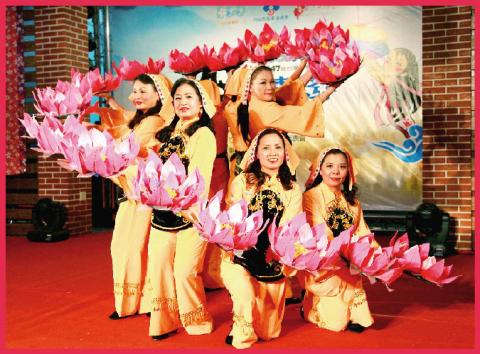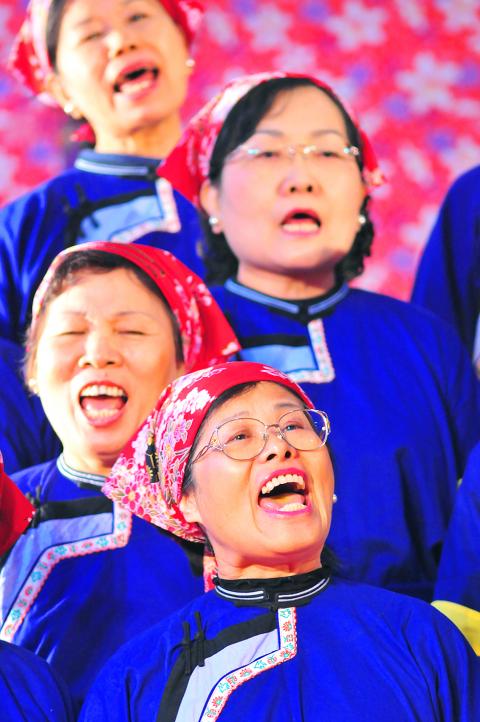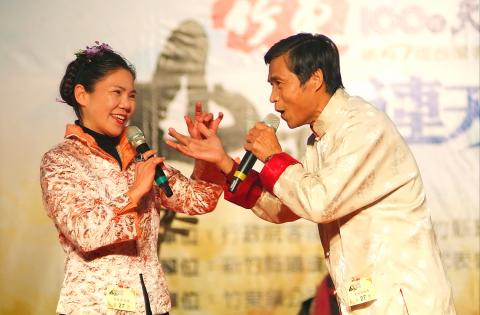Selected as one of 12 major Hakka festivals by the Hakka Affairs Council, Jhudong Township “Sky Mending Day” Taiwan Hakka Mountain Song Contest has now entered its 48th year. This year the event will take place at the Hakka Theater Park in Jhudong Township in Hsinchu County for four days starting the day after tomorrow. Hakka villages in northern Taiwan celebrate the folk festival “Sky Mending Day,” or tian chuan ri, on the 20th day of the first lunar month, which is five days after Lantern Festival. It is the most important day for Hakkas living in and around Jhudong. Hakkas generally lived in mountainous regions; therefore, they have developed their own specialized genre of mountain music. Mountain song competitions are held by many township offices in Hakka-populated areas, but the one held in Jhudong is considered to be the oldest and the biggest.
Legend has it that “Sky Mending Day” is celebrated as a memorial to the goddess Nuwa, who in Chinese mythology mended the sky by repairing a collapsed pillar holding it up, filling the cracks with five different colored rocks. On the day, some Hakkas in the north must stop what they are doing and take part in all sorts of activities to pay homage to Nuwa. Over time singing Hakka mountain songs on “Sky Mending Day” has become a custom in Hakka culture. According to the Hakka Affairs Council, Hakka mountain songs are the essence of Hakka culture. They are popular among Hakka populations in Guandong, Fujian, and Jiangxi in China, as well as in Taiwan. The songs are composed by singing and improvising and are representative of Hakka music.
Chang Yu-chen, a staffer in charge of the event at the Jhudong Township Office, told the Taipei Times that unlike mountain song contests held elsewhere, the one in Jhudong has kept strictly to classical Hakka tunes, without blending other music genres, in hopes of preserving the genuine tradition of Hakka tunes and passing them down from generation to generation. Last year the Hakka Affairs Council announced that “Sky Mending Day” would be National Hakka Day, but this move has upset most southern Hakkas who rarely celebrate “Sky Mending Day.” Nevertheless, the tradition of singing Hakka mountain songs on this day is undoubtedly part of Taiwan’s intangible cultural legacy.
(LIN YA-TI, TAIPEI TIMES)

Photo courtesy of Jhudong Township Office
照片由竹東鎮公所提供
被行政院客家委員會列為客庄十二大節慶之一的竹東「天穿日」台灣客家山歌比賽,今年已邁入第四十八屆,該活動將從後天起一連四天,於新竹縣竹東鎮客家戲曲公園開唱。「天穿日」是台灣北部客家庄的民俗節日,在元宵節後五天的農曆正月二十日。此日對竹東鎮一帶的客家人來說,可是個大日子。客家人普遍居住山區,傳唱的山歌也別具特色。許多客家鄉鎮每逢此時,會舉辦山歌比賽,尤以竹東鎮的比賽被視為歷史最悠久且最盛大。
據傳「天穿日」是為了紀念中國神話的女神「女媧」,曾煉五色石以補天而來。部分北部地區客家人這天必須放下手邊工作,取而代之的是參加各式活動感念女媧,因此衍生出享受唱山歌自娛娛人的習俗。根據行政院客家委員會的資料,客家山歌是客家文化的精髓,流行於廣東、福建、江西、台灣等地的客家人中,主要靠口創作,即興而出,是客家音樂的代表。
竹東鎮公所台灣客家山歌比賽承辦人員張玉珍告訴《台北時報》表示,有別於其他客家鄉鎮的山歌比賽,竹東堅守傳統曲調,不跨界混入其他音樂曲式,讓客家山歌原汁原味,得以保留並世代傳唱。客委會去年將「天穿日」訂為「全國客家日」,雖招致部份南部客家人不滿,畢竟鮮少南部客家人慶祝「天穿日」。即便如此,「天穿日」唱台灣客家山歌的傳統,可謂台灣無形的文化資產。
(台北時報記者林亞蒂)

Photo courtesy of Jhudong Township Office
照片由竹東鎮公所提供

Photo courtesy of Jhudong Township Office
照片由竹東鎮公所提供

Bilingual Story is a fictionalized account. 雙語故事部分內容純屬虛構。 Just yesterday, the boy had helped hang the lucky red couplets. Tonight, as firecrackers signaled the New Year, he lay in bed burning with a surging fever. The herbalist checked the boy’s pulse and went still. “The only cure is in the county town across the mountains,” he said. “But the snow is deep, and the shops are shuttered until the Fourth Day.” The boy’s father looked at the window. “I will go.” “The roads are impassable for a cart,” the herbalist warned. “And too far for a man on foot.” The concerned neighbor

Many animals spend the winter in a deep, low-energy state known as “hibernation.” When food becomes scarce and cold conditions drain body heat, bats, hedgehogs, and some ground squirrels retreat to safe shelters. Their bodies slow down to save energy: heart rates drop, breathing becomes shallow, and body temperature falls. Plenty of preparation goes into hibernation. Shorter days and falling temperatures provoke these animals to eat more and store fat, which sustains the brain and other organs. Inside the body, hormones guide this seasonal change, triggering specific behavior and switching the system to energy-saving mode. Hibernation is not the only winter survival

Contrary to popular belief, glass bottles may pose a greater microplastic risk than plastic ones. A recent study found that beverages stored in glass bottles can contain up to 50 times more microplastic particles than those in plastic containers. Researchers traced most of the contamination to the paint on the outside of the metal caps. The particles found in the drinks matched the cap’s coating in both color and composition. Experts suggest the issue may result from microscopic scratches that form as caps rub against each other during transport or storage. Such scratches can damage the painted coating, leading

1. 我沒有兄弟姊妹。 ˇ I have no brother(s) and sister(s). ˇ I don’t have any brothers or sisters. ˇ I have no siblings. χ I have not any brothers or sisters. 註:首句 no 是形容詞,加在名詞前作修飾用,意思等於 don’t have any。I have not any 是彆扭過時的講法,現代英文一般會說 I don’t have any... 或 I have no...。 又如:*In totalitarian countries people have not any freedom. 應改為 people have no freedom. 或 people do not have any freedom. 2 不要怕那隻狗。 ˇ Don’t be afraid of the dog. ˇ Don’t fear the dog. χ Don’t afraid of the dog. 註:afraid 是形容詞,在句中作補語,前面必須加 be 動詞。注意:「我不怕熱」,一般不說 *I’m not afraid of hot weather. 可以說:Hot weather doesn’t bother me. 3. 他準備好了嗎? ˇ Has he got everything